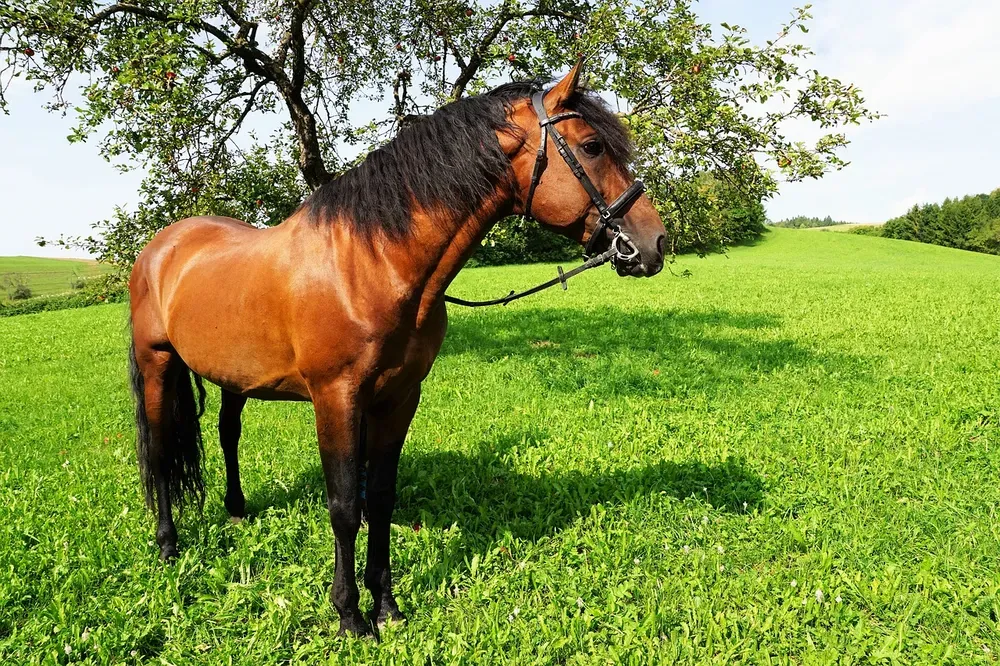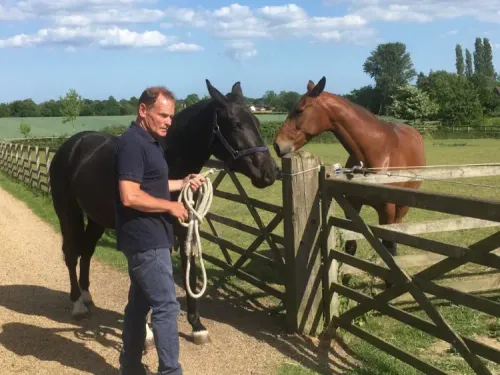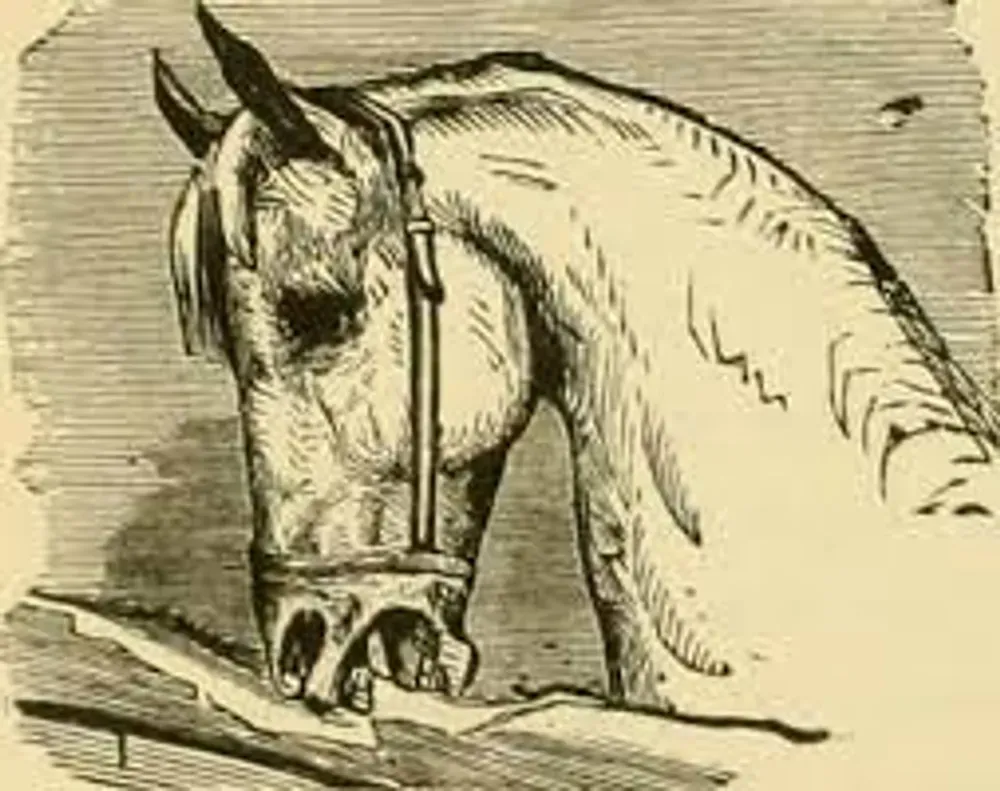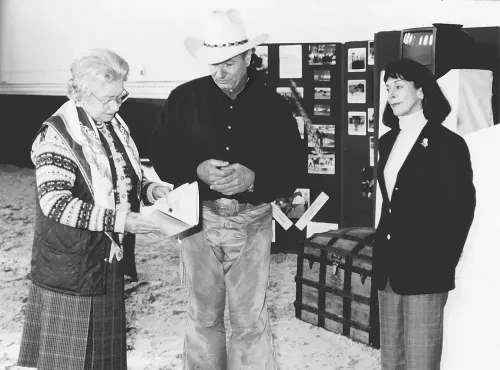
Table of Contents
Your horse's mental health should be at the forefront of his care package. This article provides essential horse healthcare tips. Whether you intend to board your horse in a DIY establishment, at home, or in a yard providing full board facilities, you must make sure your horse's emotional needs are being met.
What are my horse's mental health needs?
Horses are social animals and their top need is the company of at least one other horse. This means time grazing must be social time but you can't turn two horses out in a paddock before they have established a herd order. For more about turning out horses go to this article.

Article Suggestion
How to settle a Young Horse into its New HomeMany horses can be successfully turned out in adjacent paddocks where they can see at least one other horse grazing nearby, however, they will not be able to engage in social grooming and for some, this is a problem. Here is a checklist of things to avoid so that your horse has good mental health.
- Never expect a healthy horse to be stabled on his own without being able to see other horses. Remember, keeping a horse stabled for long periods of time without seeing other horses is keeping it in solitary confinement. Some horses will cope with some time stabled on their own but it is not considered good practice.
- Even with company, do not expect your horse to spend 24 hours a day being stabled. That is unless it is for a medical reason. Even elite competition horses that are ridden daily and kept very fit will require daily downtime when they can graze for at least two hours.
- Some horses just do not cope with being stabled unless it is to be tacked up and ridden. These horses must spend most of their time on the grass with adequate shelter and rugging as necessary.
Top tip!
Horses spending much time being stabled must be exercised daily and turned out daily.
Do different horses have different mental needs and tolerances?
Yes, just like humans, horses have different mental tolerances. Some horses can cope with being stabled for hours while others are stressed if they spend 30 minutes in a stable. Some can be turned out alone on the grass for some hours with no stress, while others will not settle without a grazing companion.
Remember, horses cannot express their emotions verbally!
We must learn to read their body language and behaviour to understand the signs of their mental stress.
What do I look for in a horse stressed about being out on grass?
Stressed horses will make it clear in many ways and here are the main things to notice in a horse stressed while on grass. One sign is continually walking up and down the field boundary and some horses will actually wear away all the grass to make a bare earth track along this part of their field. This behaviour is common in horses that do not like being left on their own in a field.
Alternatively, the horse that dislikes being turned out alone might continually trot, canter or gallop around their field without settling to graze. However, some high-spirited horses will charge around out of excitement, but this should settle down and they will then enjoy their time on grass.
Finally, a horse persistently calling another horse that can not be seen is a stress indicator (also seen in stabled horses).
What do I look for in a horse stressed about being put in a stable?
Stabled horses will show stress in other ways and here are the behaviours to be aware of. Continually stable walking or weaving. Weaving is swinging the head from side to side over the stable door while crossing the front legs back and forth. Some horses will only weave or stable walk out of excitement at feed time and they are not generally stressed. Stable walkers and weavers can be managed but not cured.
Irritable kicking out at the stable wall is a strong indication a horse is stressed about being in a stable. and is showing anger about the situation. These horses can become aggressive and dangerous for humans to be around.
Crib biting and wind-sucking are stress-induced behavioural vices that affect a horse's physical health and they are more common in stabled horses. Crib biting involves the horse grabbing a horizontal object (frequently the stable door) and sucking air into the stomach. Windsucking involves sucking air to the stomach without grabbing an object. Crib-biting and wind-sucking horses can be managed but not cured.
It is important that your horse's mental needs are catered for and the above signs of emotional stress can not be ignored.

A crib-biting horse
This crib-biting horse is arching his neck while biting an object and will be sucking air into its stomach. These horses are frequently in poor physical shape and are prone to developing health issues.
It is important that your horse's mental needs are catered for and the above signs of emotional stress can not be ignored.
Here are the top tips to improve or restore your horse's mental well-being
- Horses that do not like being stabled must spend much of the time out eating grass. Some will be happy coming in for the nighttime with another companion horse that can be seen over the stable door.
- Horses that do not like being stabled without seeing other stabled horses should not be left alone in a stable.
- A horse that is stressed when turned out on its own must always have a field companion.
- All stabled horses must have adequate hay to keep them occupied for much of the time and they must have daily exercise and turn out.
Horse walkers are not a good way to exercise horses!
It is not good practice for stabled horses to have a brief period on a horse walker instead of being ridden daily and turned out to graze. A daily hack of 1.5 hours does wonders for most horses' emotional wellness without putting undue stress on their bodies.
The take-home message
Just like humans, horses can have mental health issues so the important thing is to provide an environment that suits your horse and his tolerance to different stresses. If you can not provide the emotional care package your horse requires his health will suffer and it is likely your purse strings will be stretched with additional health care expenses. When your horse is in a good emotional place he will thrive and his training will be far easier.

Article Suggestion
Monty Roberts: Revolutionising Horse Training Through Join-Up
